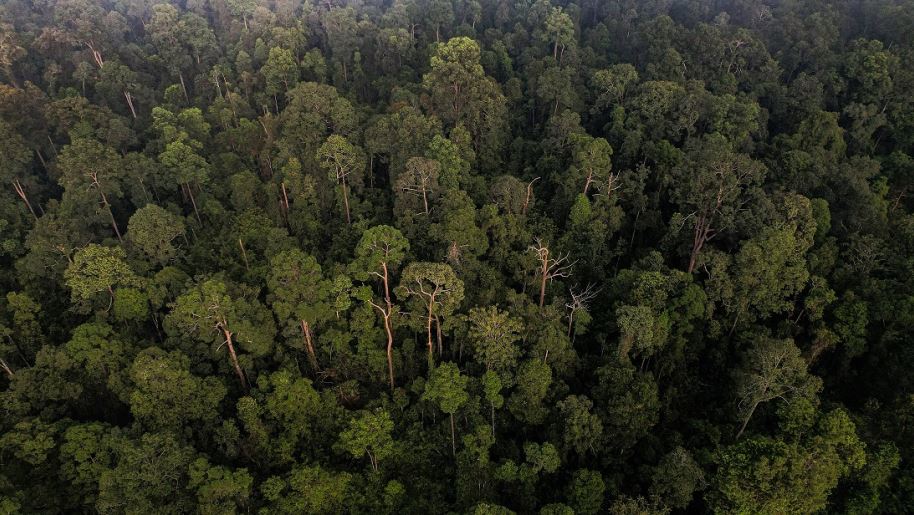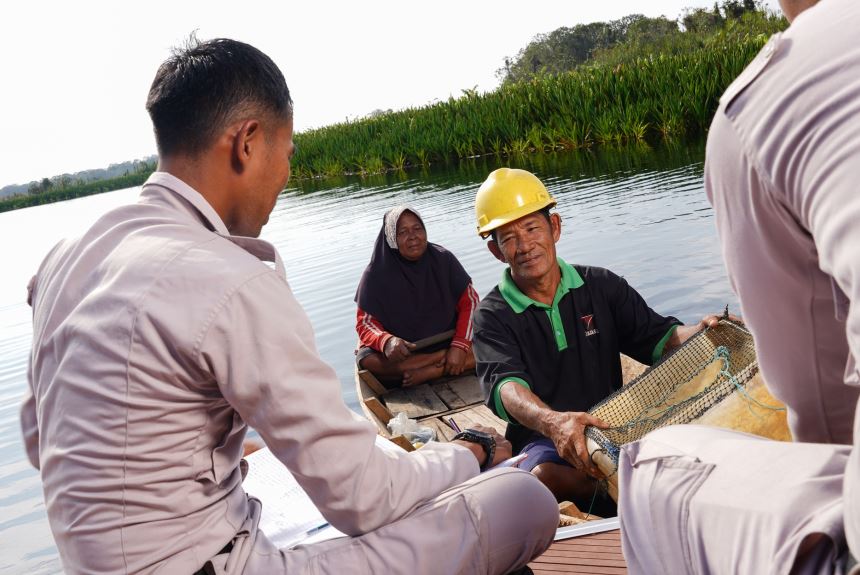April 30, 2024
More than 40,000 people live around Restorasi Ekosistem Riau (RER) concession areas, with around 17,000 on the Kampar Peninsula and 24,000 on Padang Island. This makes community engagement in these locations absolutely integral to environmental and biodiversity conservation. Before RER was established, both areas had suffered from decades of degradation due to commercial and illegal logging activities by private business and local communities.
Today, RER teams are working closely with local communities to make their economic activities more sustainable and raise awareness of conservation issues, thereby reducing the key drivers of deforestation. Education and outreach activities are helping local people understand the importance of conservation and restoration, while also demonstrating how a healthy forest can deliver economic and social benefits for local communities.
Prevention and preservation
On the Kampar Peninsula, RER is working in collaboration with a local group called Hutan Desa Segamai to prevent illegal logging and preserve the region’s natural resources. The Segamai village forest is flanked by two companies. One of these is PT. Gemilang Citra Nusantara (GCN), one of the entities which holds an RER ecosystem restoration license. According to this license, the forests in the PT. GCN area are left undisturbed so they can regenerate naturally.

In 2023, RER and the local authority in Segamai Village signed a cooperation agreement to strengthen governance and protection of the forests around the village, covering an area of about 2,270 hectares. This cooperative agreement includes the building of guard posts and watchtowers, and the installation of warning and information boards.
Sustainable fishing
There are four main rivers on the Kampar Peninsula – the Kutup, Turip, Serkap, and Sangar rivers – which extend between 20 and 30 kilometers into the peninsula’s central core peat dome. These rivers are traditional ‘highways of life’ containing an abundant variety of fish, as well as supporting a diverse array of wildlife. Ensuring continued community access to these rivers for fishing, transport, and other livelihood activities is important to maintaining traditional cultural practices and human well-being in the area.
Before RER was established, local fishermen working on the Serkap River were known to use unsustainable fishing practices, such as poison or electro-fishing. Some also burned vegetation on the river banks, which exacerbated forest degradation and damaged natural ecosystems. Today, RER works closely with the local Serkap River fishing community group — known as Serkap Jaya Lestari — to ensure access to fisheries and encourage traditional sustainable fishing practices, with the aim of helping community members improve their livelihoods in harmony with the protection and restoration of the forest.
A collaboration agreement was established in December 2016 to coordinate a range of issues, including fishing rights, maintaining and improving fish habitats and catches, reporting of fish harvests and sustainable fishing practices. Since the agreement, catches and incomes have risen, in parallel to improved ecosystem health on the Serkap River.
Building awareness, developing sustainable livelihoods
In October 2021, RER hosted a community fishery training session at the Eco-Research Camp, which was attended by communities from five villages surrounding RER. The two-day training session was led by experts from the University of Riau, who advised on topics including fish processing, the importance of fish restocking, how to improve the shelf-lives of fish products, and reducing fish losses during processing.
“RER has educated us against unsustainable ways of fishing,” explains Bahtiar, who is Chair of the Serkap Jaya Lestari group. “With responsible fishing methods, we only catch fish that fit the market standard, so that the sustainability of other fish is maintained; it was hard in the beginning, but we can see the results now.”
In addition to education on sustainable fishing practices, RER teams also provide support for equipment management and maintenance. When fishermen’s huts fell into disrepair, RER provided material support, such as wood and tarpaulins, and helped with renovations. In addition, RER provided solar panels for the huts, so the fishermen no longer needed to use kerosene lamps at night. Through a combination of knowledge transfer and practical support, RER is providing the catalyst for positive behavioral change and improving standards of living for the fishers of Riau.
No-burn farming
The RER teams also cooperate closely with villagers from Sagar sub-village and Segamai Village on the Kampar Peninsula, and from four villages on Padang Island, to support no-burn vegetable farming. The program was set up to reduce slash and burn farming, which has been common practice for decades, and to provide communities with alternative methods of land preparation that will produce valuable food crops.
The communities are provided with seedlings of mainly vegetable crops, such as red and green chili, red ginger, eggplant, tomato, cayenne and green beans, together with equipment and supplies like hand tools and fertilizers. Field schools are organized regularly to discuss problems and improve techniques for crop productivity.
“Through the RER initiative, we hope that communities will become more empowered and play an active role in improving their welfare,” says Ahmad Fahrudin, Executive Director of the BIDARA NGO, an RER partner organization devoted to community resources development. “Only through collaboration and cooperation between related stakeholders can we achieve our purpose, which is to improve the welfare of the community through a sustainable way of living.”

From capacity building to awareness and from investment to engagement, RER is working to ensure local communities in the Kampar Peninsula and Padang Island remain a focal point of conservation efforts. Outreach initiatives are not only helping conserve the precious peatlands of Riau, but also empowering small businesses and preserving traditional ways of living. For the peatland forests of Riau, this collaboration is key to a more sustainable future; for RER, working towards that future with the people of Riau remains a firm commitment and a lifelong collaboration.
For more information about RER partnerships with communities in Riau, please read our Special Report.